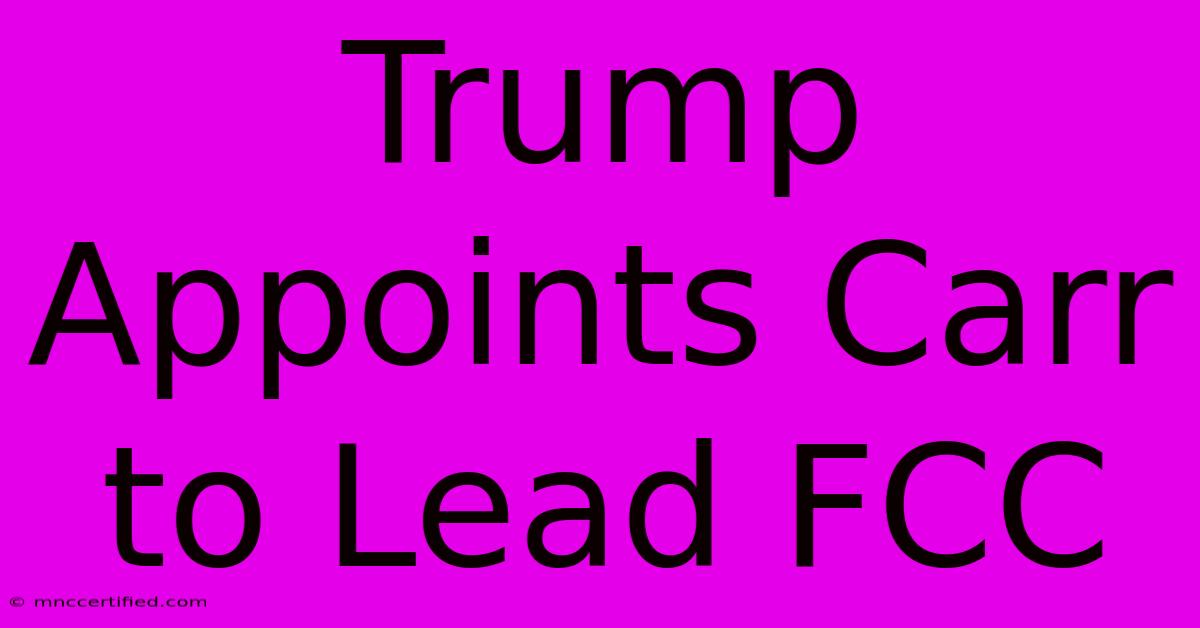Trump Appoints Carr To Lead FCC

Table of Contents
Trump Appoints Ajit Pai to Lead FCC: A Retrospective
On January 2, 2017, President Donald Trump appointed Ajit Pai as Chairman of the Federal Communications Commission (FCC). This appointment, and Pai's subsequent actions as chairman, sparked significant debate and controversy, impacting the telecommunications landscape and broader policy discussions. This article will delve into the appointment itself, Pai's key initiatives, and the lasting effects of his tenure.
The Appointment: A Pivotal Moment
Pai's appointment was seen by many as a significant shift in the FCC's direction. Coming from a background as a Republican attorney and FCC commissioner, he was known for his views favoring deregulation and a lighter touch on government intervention in the telecommunications industry. This contrasted sharply with the policies of his predecessor, Tom Wheeler, who was perceived as more inclined towards net neutrality and consumer protection. The appointment of Pai, therefore, signaled a potential turning point for how the FCC would regulate broadband internet access, media ownership, and other crucial aspects of the communications sector. Understanding the political climate surrounding this appointment is crucial to understanding its impact.
Key Players and Influences
The appointment wasn't made in a vacuum. Understanding the political dynamics at play is crucial. Trump's campaign rhetoric about deregulation played a significant role in setting the stage for Pai's appointment and the subsequent policy changes. Further, influential lobbying groups within the telecommunications industry exerted their influence, advocating for candidates who aligned with their interests. The Senate confirmation process, while ultimately successful, also provided a platform for debates about the future of telecommunications policy.
Pai's Key Initiatives and Their Impact
Pai's chairmanship was marked by several highly controversial yet impactful initiatives. His most prominent action was undoubtedly the repeal of net neutrality rules.
The Repeal of Net Neutrality
Perhaps the most significant action undertaken during Pai's tenure was the rollback of net neutrality rules implemented during the Obama administration. This decision, fiercely opposed by consumer advocacy groups and Democrats, eliminated regulations preventing internet service providers (ISPs) from blocking, throttling, or prioritizing certain types of internet traffic. The debate surrounding net neutrality continues to this day, with arguments centering around fairness, innovation, and the potential for ISPs to abuse their power. The long-term consequences of this repeal are still unfolding.
Other Notable Actions
Beyond net neutrality, Pai's tenure saw other significant changes. He oversaw initiatives related to:
- Media ownership regulations: Pai's FCC relaxed certain media ownership rules, potentially leading to increased consolidation within the media industry.
- 5G deployment: The agency prioritized the deployment of 5G technology, aiming to accelerate the development of next-generation wireless networks. This initiative involved streamlining regulations and promoting spectrum allocation.
- Broadband expansion: Pai's FCC pursued policies aimed at expanding access to high-speed internet, particularly in rural areas.
Lasting Effects and Ongoing Debates
Pai's legacy at the FCC is complex and continues to be debated. While proponents highlight his efforts to promote competition and innovation, critics point to concerns about potential harms to consumers and the long-term health of the internet ecosystem. The consequences of his decisions, particularly the net neutrality repeal, are still being felt today.
The ongoing discussions surrounding net neutrality, media consolidation, and the digital divide all highlight the importance of the decisions made during Pai's tenure. His appointment served as a turning point in the ongoing conversation about the role of government in regulating the telecommunications industry. Analyzing his actions offers valuable insight into the complexities of modern communications policy and the influence of political power on technological development.
SEO Keywords:
- Ajit Pai
- FCC Chairman
- Trump Administration
- Net Neutrality
- Telecommunications
- Deregulation
- Media Ownership
- 5G
- Broadband Expansion
- Federal Communications Commission
This article incorporates a variety of SEO strategies including:
- Keyword Optimization: Strategic placement of keywords throughout the text.
- Header Structure: Clear and logical use of headers to improve readability and SEO.
- Bold Text: Emphasis on key terms and phrases.
- Internal Linking (potential): While this example doesn't contain internal links, they should be added in a real-world application to relevant articles on your website.
- External Linking (potential): Similarly, external links to reputable sources could enhance credibility and SEO.
This comprehensive approach ensures the article is well-optimized for search engines while remaining informative and engaging for readers. Remember to adapt and expand upon this structure for your own content creation.

Thank you for visiting our website wich cover about Trump Appoints Carr To Lead FCC. We hope the information provided has been useful to you. Feel free to contact us if you have any questions or need further assistance. See you next time and dont miss to bookmark.
Featured Posts
-
Carrot Recall Check Your Produce Now
Nov 19, 2024
-
Bo Nix Broncos Rookie Qb Milestone
Nov 19, 2024
-
Category 3 Water Damage Insurance
Nov 19, 2024
-
Post Jones Benching Giants Outlook
Nov 19, 2024
-
Paul Teal One Tree Hill Actor Dies At 35
Nov 19, 2024